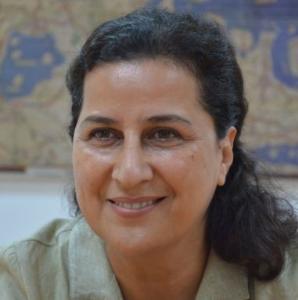Мамандар конференциясы
Толық мәлімет
Das chinesische Mega-Infrastrukturprojekt “Belt and Road Initiative (BRI)“ wird nicht nur als Stärkung für Chinas Position als globale Wirtschaftsmacht gesehen, sondern auch als Versuch, sich als zentraler geopolitischer Akteur auf globaler Ebene zu positionieren. Für die Mittelmeerregion und die Staaten Nordafrikas wirft das Projekt damit zahlreiche Fragen auf: Was sind die zugrundliegenden geopolitischen Ambitionen des Projekts? Welche Verschiebungen sind im regionalen wirtschaftlichen und geopolitischen Machtgleichgewicht im Mittelmeerraum zu erwarten? Welchen Einfluss wird das Projekt auf die Wirtschaftssysteme der Region haben? Ist eine Ablösung derzeitiger Entwicklungsmodelle und die Herausbildung eines Entwicklungsmodells nach chinesischem Vorbild zu erwarten? Und wie positionieren sich die Staaten Nordafrikas gegenüber dem Projekt?
Programm
Tuesday, 10 April 2018
09:00 Opening
H.E. Khemaies Jhinaoui, Minister of Foreign Affairs, Tunisia (TBC)
09:15 Welcoming remarks
Dr. Canan Atilgan, Director, Regional Program South Mediterranean, Konrad-Adenauer-Stiftung
09:30 The outlines of the new silk roads
Chair: Dr. Canan Atilgan, Director, Regional Program South Mediterranean, Konrad-Adenauer-Stiftung
- The Belt and Road Initiative: Ambitions, Components and State of Play
Dr. Aiping Zeng, Assistant Research Fellow, China Institute of International Studies (CIIS) & Deputy Executive Director, China-Asian African Cooperation Centre (CAACC), Beijing
- Presentation of the policy paper: “The new silk roads and North Africa: What are the synergies?”
Mehdi Taje, Director, Global Prospect Intelligence, Tunisia
10:45 Panel 1: Geopolitical considerations of the BRI
Chair: Mohamed Sahbi Basly, President, Council of Tunisian-Chinese Cooperation & Vice-Chairman, World Public Diplomacy Organization (WPDO) in charge of the Mediterranean
- The new silk roads: A chance for the Maghreb?
Abdelhak Bassou, Senior Fellow, OCP Policy Center, Morocco
- North Africa: internal economic considerations and their geopolitical implications
Dr. Hamza Meddeb, Associate Fellow, Middle East and North Africa Programme, Chatham House, Tunisia
- Patterns and trends in Chinese involvement in the Middle East
Helena Legarda, Research Associate, Mercator Institute for China Studies, Germany
- Geopolitics of the maritime silk roads
Dr. Mathieu Duchâtel, Senior Policy Fellow and Deputy Director of the Asia and China Programme, European Council on Foreign Relations, Paris
13:45 Panel 2: Economic and socio-economic dynamics of the BRI
Chair: Martin Henkelmann, General Director, German-Tunisian Chamber of Industry and Commerce
- Economic development in North Africa: new partners, new opportunities
Ali Benouari, President Ecofinance & former Minister of Treasury, Algeria
- Enhanced connectivity in the energy sector
Dr. Frank Umbach, Research Director, European Centre for Energy and Resource Security (EUCERS), King's College, London
- The role of the private sector in the BRI
Majdi Hassen, Executive Director, Arab Institute for Business Leaders (IACE), Tunisia
- BRI and the role of the banking sector
Ahmed Karam, Vice-President, Amen Bank, Tunisia
15:45 Keynote speech: The BRI in the Mediterranean – a perspective from Egypt
H.E. Amre Moussa, former Secretary-General, Arab League, Egypt
16:15 Panel 3: Positioning of North African countries vis-à-vis the BRI: state of play and outlook
Chair: H.E. Dr. Mahmoud Gebril, Former Prime Minister of Libya, President of the National Forces Alliance
- A new regional hub in North Africa?
Hassane Saoudi, Professor & Associated Researcher, Royal Institute for Strategic Studies (IRES), Morocco
- A chance for economic diversification?
H.E. Ahmed Ghozali, former Prime Minister, Algeria (TBC)
- New dynamics for growth
Tahar Bayahi, Executive President, SICO Tunisia & President, Chinese-Tunisian Chamber of Commerce
18:15 Cocktail reception
Wednesday, 11 April 2018
09:30 Keynote speech: The new silk roads in the Mediterranean – a European perspective
H.E. Miguel Ángel Moratinos, former Minister of Foreign Affairs, Spain
10:00 Panel 4: BRI – A new and sustainable model for development?
Chair: Mehdi Taje, Director, Global Prospect Intelligence, Tunisia
- The BRI and its contribution to sustainable development
Dr. Chang Liu, Assistant Research Fellow, Department of Developing Countries Studies, China Institute of International Studies
- The emergence of new development models
Peter Stein, Member of the German Bundestag, Member of the Committee on Economic Cooperation and Development
- The BRI: Towards a more flexible development policy approach?
Dr. Alice Ekman, Researcher, Institut Français des Relations Internationales (Ifri)
- Emerging powers and new development models: Questions of sustainability
Alexandre Kateb, Director, COMPETENCE FINANCE, Algeria
- The BRI and economic aspects of the reconstruction in Syria
H.E. Adnan Omran, former Deputy Secretary-General, Arab League, Syria
13:30 Roundtable: How to best position Tunisia: Strategic orientations and recommendations
Chair: Afif Chelbi, President, Conseil des Analyses Economiques, Présidence du Gouvernement, Tunisia
Discussants:
- Khalil Laabidi, President, Tunisian Investment Authority
- Habib Karaouli, CEO, Capital African Partners Bank, Tunisia
- Kais Daly, former CEO of Groupe Chimique Tunisien
- Rear Admiral Kamel Akrout, Senior National Security Advisor, Office of the President of the Republic, Tunisia
- H.E. Dr. Salah Hannachi, President Atlas Foundation & former diplomat, Tunisia
- Samir Azzi, CEO, Tunisian Export Promition Center (CEPEX), Tunisia
- Anis Jaziri, Secretary General, Tunisia Africa Business Council (TABC) & former Advisor for Economic Affairs to the President of the Republic, Tunisia
- H.E. Slahedinne Jemmali, Ambassador & Special Representative of the Secretary-General of the Arab League to Libya




